Star Trek: The Corbomite Maneuver
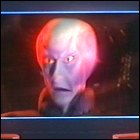 The tenth episode of Gene Roddenberry’s science fiction series Star Trek airs on NBC. Clint Howard guest stars; this is actually the first episode produced after NBC’s order for the first season of the show.
The tenth episode of Gene Roddenberry’s science fiction series Star Trek airs on NBC. Clint Howard guest stars; this is actually the first episode produced after NBC’s order for the first season of the show.
Star Trek: Dagger Of The Mind
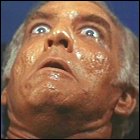 The ninth episode of Gene Roddenberry’s science fiction series Star Trek airs on NBC. Morgan Woodward guest stars.
The ninth episode of Gene Roddenberry’s science fiction series Star Trek airs on NBC. Morgan Woodward guest stars.
Star Trek: Miri
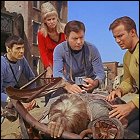 The eighth episode of Gene Roddenberry’s science fiction series Star Trek airs on NBC. Kim Darby and Michael J. Pollard guest star.
The eighth episode of Gene Roddenberry’s science fiction series Star Trek airs on NBC. Kim Darby and Michael J. Pollard guest star.
Star Trek: What Are Little Girls Made Of?
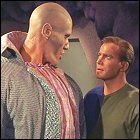 The seventh episode of Gene Roddenberry’s science fiction series Star Trek airs on NBC. Ted Cassidy (The Addams Family) and Andrea Jackson guest star.
The seventh episode of Gene Roddenberry’s science fiction series Star Trek airs on NBC. Ted Cassidy (The Addams Family) and Andrea Jackson guest star.
Star Trek: Mudd’s Women
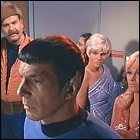 The sixth episode of Gene Roddenberry’s science fiction series Star Trek airs on NBC. Roger C. Carmel guest stars as interplanetary rogue Harry Mudd in the character’s first live action appearance.
The sixth episode of Gene Roddenberry’s science fiction series Star Trek airs on NBC. Roger C. Carmel guest stars as interplanetary rogue Harry Mudd in the character’s first live action appearance.
Star Trek: The Enemy Within
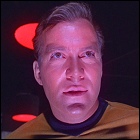 The fifth episode of Gene Roddenberry’s science fiction series Star Trek airs on NBC. The episode is written by renowned science fiction writer Richard Matheson, author of the novel “I Am Legend”.
The fifth episode of Gene Roddenberry’s science fiction series Star Trek airs on NBC. The episode is written by renowned science fiction writer Richard Matheson, author of the novel “I Am Legend”.
Star Trek: The Naked Time
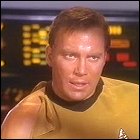 The fourth episode of Gene Roddenberry’s science fiction series Star Trek airs on NBC. Bruce Hyde guest stars as Lt. Kevin Riley.
The fourth episode of Gene Roddenberry’s science fiction series Star Trek airs on NBC. Bruce Hyde guest stars as Lt. Kevin Riley.
Star Trek: Where No Man Has Gone Before
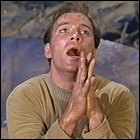 The third episode of Gene Roddenberry’s science fiction series Star Trek airs on NBC. Sally Kellerman (M*A*S*H) and Gary Lockwood (2001) guest star. This is the second pilot, and shows numerous noticeable differences in casting and costumes, but NBC and Desilu Studios elect to air it anyway, giving the production team time to complete more new episodes.
The third episode of Gene Roddenberry’s science fiction series Star Trek airs on NBC. Sally Kellerman (M*A*S*H) and Gary Lockwood (2001) guest star. This is the second pilot, and shows numerous noticeable differences in casting and costumes, but NBC and Desilu Studios elect to air it anyway, giving the production team time to complete more new episodes.
Star Trek: Charlie X
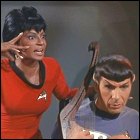 The second episode of Gene Roddenberry’s science fiction series Star Trek airs on NBC. Robert Walker Jr. guest stars.
The second episode of Gene Roddenberry’s science fiction series Star Trek airs on NBC. Robert Walker Jr. guest stars.
Star Trek: The Man Trap
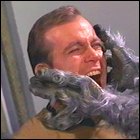 With over two years of development behind it, Gene Roddenberry’s Star Trek finally premieres on NBC with The Man Trap, the completed episode that the network feels most strongly represents the series concept and will connect with a 1960s audience accustomed to police shows and westerns. (It also helps NBC – and its corporate parent, General Electric, who has a stake in the television manufacturing industry – showcase its new season in color.)
With over two years of development behind it, Gene Roddenberry’s Star Trek finally premieres on NBC with The Man Trap, the completed episode that the network feels most strongly represents the series concept and will connect with a 1960s audience accustomed to police shows and westerns. (It also helps NBC – and its corporate parent, General Electric, who has a stake in the television manufacturing industry – showcase its new season in color.)
More about Star Trek in the LogBook
Hear about it on the Sci-Fi 5 podcast
NBC picks up Star Trek
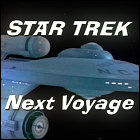 NBC announces that it has added a new full-color hour-long science fiction series, Gene Roddenberry’s Star Trek, to its fall 1966 schedule. Unusually, the show has produced two wildly different pilot episodes, with NBC having asked for specific changes to the series format as early as 1965, when it passed on the original pilot, The Cage. One change specifically requested between pilots by NBC, the omission of a “Satanic” alien character named Mr. Spock, doesn’t prevent the network from ordering 16 episodes from Desilu Studios.
NBC announces that it has added a new full-color hour-long science fiction series, Gene Roddenberry’s Star Trek, to its fall 1966 schedule. Unusually, the show has produced two wildly different pilot episodes, with NBC having asked for specific changes to the series format as early as 1965, when it passed on the original pilot, The Cage. One change specifically requested between pilots by NBC, the omission of a “Satanic” alien character named Mr. Spock, doesn’t prevent the network from ordering 16 episodes from Desilu Studios.
Star Trek: the second pilot
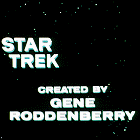 Filming begins on a nearly-unprecedented second pilot episode of Gene Roddenberry’s Star Trek at the request of NBC, which saw promise (but not enough action) in The Cage. When Jeffrey Hunter declines to return to the role of Captain Christopher Pike, the character is renamed (Captain James R. Kirk) and recast (in the person of well-regarded Canadian actor William Shatner). The first edit of the new episode, Where No Man Has Gone Before, features a completely different musical theme (again by Alexander Courage) and other oddities, such as Quinn-Martin-Productions-style “Act” and “Tonight’s Episode” banners at the top of each act of the show, as well as evidence that the names of the characters played by George Takei and James Doohan had yet to be decided.
Filming begins on a nearly-unprecedented second pilot episode of Gene Roddenberry’s Star Trek at the request of NBC, which saw promise (but not enough action) in The Cage. When Jeffrey Hunter declines to return to the role of Captain Christopher Pike, the character is renamed (Captain James R. Kirk) and recast (in the person of well-regarded Canadian actor William Shatner). The first edit of the new episode, Where No Man Has Gone Before, features a completely different musical theme (again by Alexander Courage) and other oddities, such as Quinn-Martin-Productions-style “Act” and “Tonight’s Episode” banners at the top of each act of the show, as well as evidence that the names of the characters played by George Takei and James Doohan had yet to be decided.
The Sound of Star Trek
 Halfway through filming on the Star Trek pilot episode, The Cage, the attention of the show’s producers turns to the music for the pilot, and possible composers. Among the composers approached but unable to commit to Star Trek are Jerry Goldsmith (later to score 1979‘s Star Trek: The Motion Picture), John Williams (later of Star Wars and Lost In Space fame), Lalo Schifrin (Mission: Impossible), Elmer Bernstein, and Dominic Frontiere (The Outer Limits); a young composer named Alexander Courage, whose schedule is open, is considered especially promising.
Halfway through filming on the Star Trek pilot episode, The Cage, the attention of the show’s producers turns to the music for the pilot, and possible composers. Among the composers approached but unable to commit to Star Trek are Jerry Goldsmith (later to score 1979‘s Star Trek: The Motion Picture), John Williams (later of Star Wars and Lost In Space fame), Lalo Schifrin (Mission: Impossible), Elmer Bernstein, and Dominic Frontiere (The Outer Limits); a young composer named Alexander Courage, whose schedule is open, is considered especially promising.
Star Trek pilot filming begins
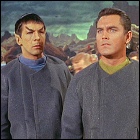 At Hollywood’s Desilu Studios, filming begins on The Cage, the unaired first attempt at a pilot episode of Gene Roddenberry’s science fiction series Star Trek. Starring Jeffrey Hunter as Captain Christopher Pike and Leonard Nimoy as the exotic-looking alien science officer Spock, filming proceeds at a brisk pace, despite numerous delays due to the show’s then-novel special effects, set and costuming requirements. Though the result is viewed enthusiastically by all involved, the completed pilot stirs little enthusiasm at the television networks. NBC thinks the series premise has promise, but that as it stands, The Cage is “too cerebral” for prime time. Ironically, exactly two years later, most of the footage from The Cage is broadcast anyway, as part of The Menagerie – a fast favorite among the viewers for whom it was deemed to be too brainy.
At Hollywood’s Desilu Studios, filming begins on The Cage, the unaired first attempt at a pilot episode of Gene Roddenberry’s science fiction series Star Trek. Starring Jeffrey Hunter as Captain Christopher Pike and Leonard Nimoy as the exotic-looking alien science officer Spock, filming proceeds at a brisk pace, despite numerous delays due to the show’s then-novel special effects, set and costuming requirements. Though the result is viewed enthusiastically by all involved, the completed pilot stirs little enthusiasm at the television networks. NBC thinks the series premise has promise, but that as it stands, The Cage is “too cerebral” for prime time. Ironically, exactly two years later, most of the footage from The Cage is broadcast anyway, as part of The Menagerie – a fast favorite among the viewers for whom it was deemed to be too brainy.
Star Trek
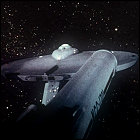 Television writer Gene Roddenberry, who has already written scripts for shows such as Have Gun, Will Travel, writes his first-draft series proposal for a new hour-long science fiction drama, which he calls Star Trek. The series involves the starship S.S. Yorktown, commanded by Captain Robert April. Roddenberry will spend several months refining his concept before it is bought by Desilu Studios and shopped around to the American television networks. At the time he’s writing the pitch, Roddenberry is still overseeing his first TV creation, a military series called The Lieutenant, which has enjoyed decent ratings but is leaving its network, NBC, nervous with its tendency to deal directly with issues related to the widening conflict in Vietnam.
Television writer Gene Roddenberry, who has already written scripts for shows such as Have Gun, Will Travel, writes his first-draft series proposal for a new hour-long science fiction drama, which he calls Star Trek. The series involves the starship S.S. Yorktown, commanded by Captain Robert April. Roddenberry will spend several months refining his concept before it is bought by Desilu Studios and shopped around to the American television networks. At the time he’s writing the pitch, Roddenberry is still overseeing his first TV creation, a military series called The Lieutenant, which has enjoyed decent ratings but is leaving its network, NBC, nervous with its tendency to deal directly with issues related to the widening conflict in Vietnam.
Stage 7: The Secret Weapon Of 117
 The TV anthology series Stage 7 presents the first produced science fiction television script written by future Star Trek creator Gene Roddenberry, The Secret Weapon Of 117. Ricardo Montalban stars as one of a pair of aliens trying to assess whether or not Earth has the technology to retaliate against infiltration and invasion by their species. Drawing from his past police work, Roddenberry has already sold scripts to Ziv Television Programs for Mr. District Attorney and Highway Patrol, and pitched an ultimately unsold script to Ziv’s Science Fiction Theatre series; this is his first genre work to make it to the screen. Sadly, no recordings still seem to exist of this self-contained story.
The TV anthology series Stage 7 presents the first produced science fiction television script written by future Star Trek creator Gene Roddenberry, The Secret Weapon Of 117. Ricardo Montalban stars as one of a pair of aliens trying to assess whether or not Earth has the technology to retaliate against infiltration and invasion by their species. Drawing from his past police work, Roddenberry has already sold scripts to Ziv Television Programs for Mr. District Attorney and Highway Patrol, and pitched an ultimately unsold script to Ziv’s Science Fiction Theatre series; this is his first genre work to make it to the screen. Sadly, no recordings still seem to exist of this self-contained story.